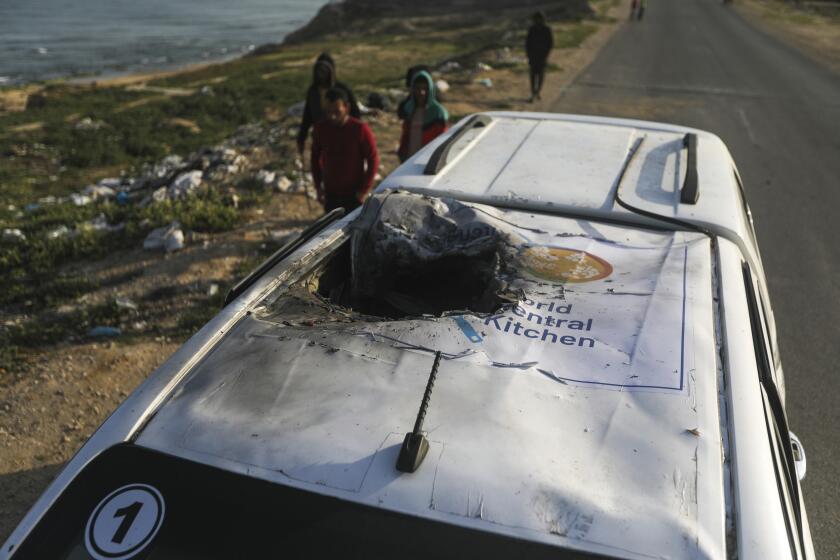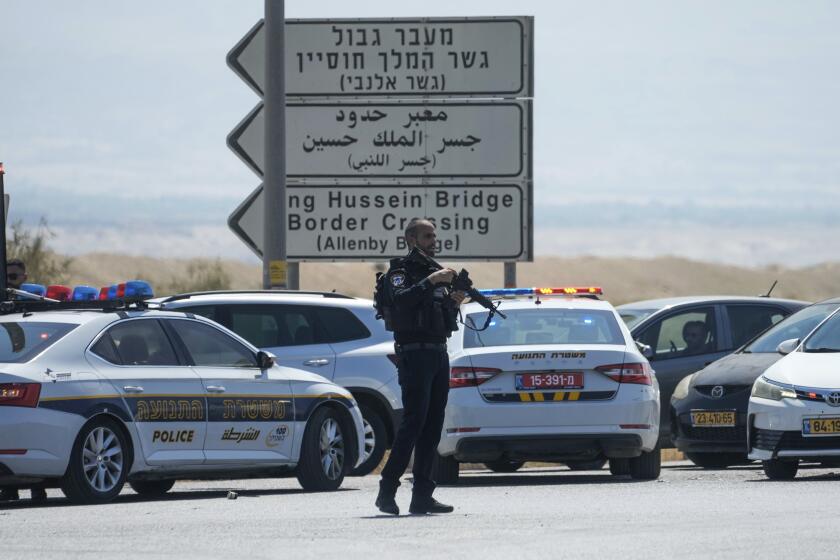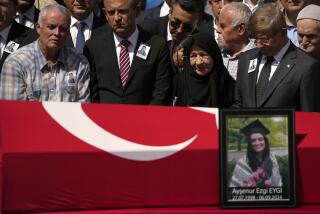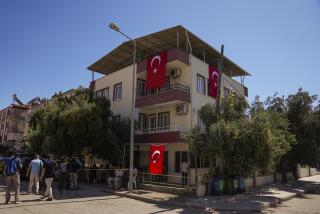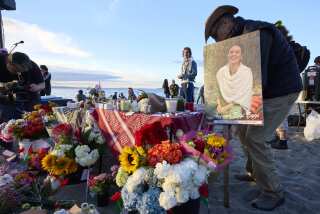In young American activist’s death in the West Bank, associates see pattern of impunity
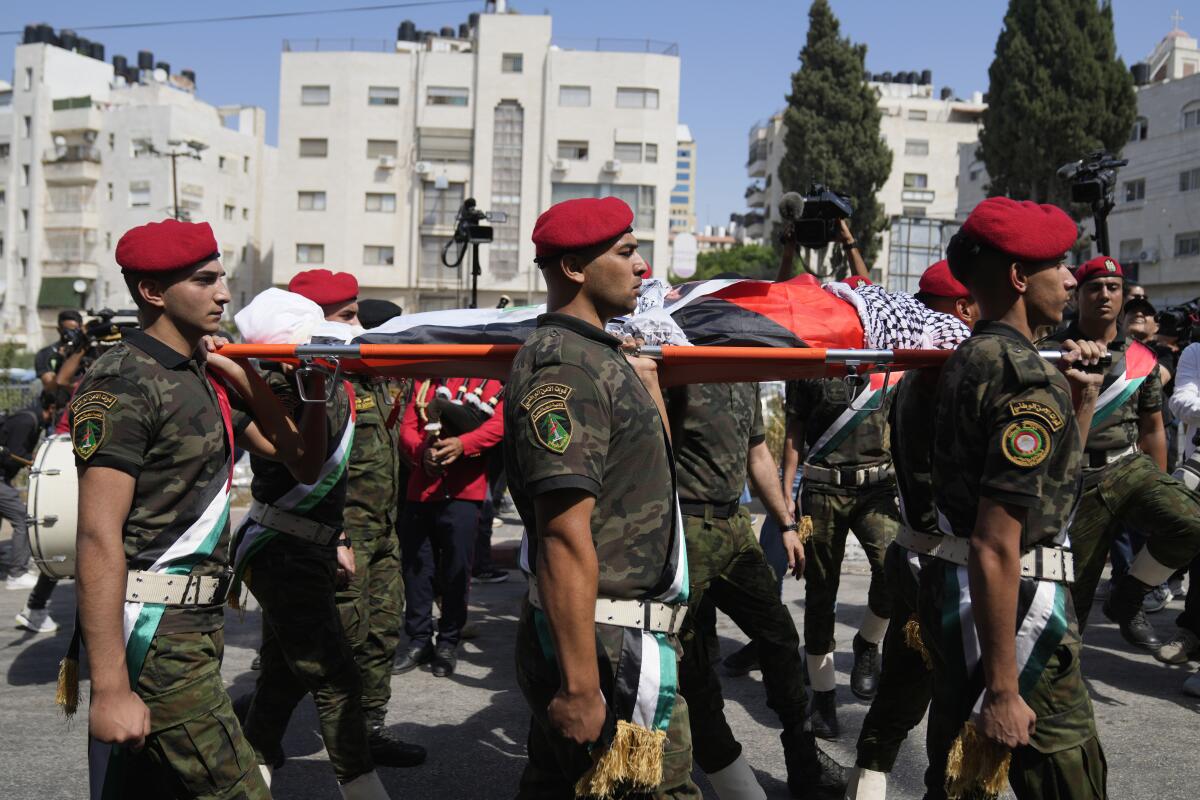
- Share via
JERUSALEM — The young American activist, newly arrived in the West Bank, was nervous but determined. She believed that her presence, along with that of other foreign protesters, could help protect the land and lives of Palestinian villagers in the shadow of an encroaching Jewish settlement.
On Friday, in the scant shelter of a few gnarled olive trees near the Palestinian village of Beita, a first field outing became her last. As her companions on a rocky, arid hillside looked on in horror, Aysenur Ezgi Eygi, 26 — a bubbly, black-haired recent graduate of the University of Washington — fell to the ground, mortally wounded by a bullet to the head.
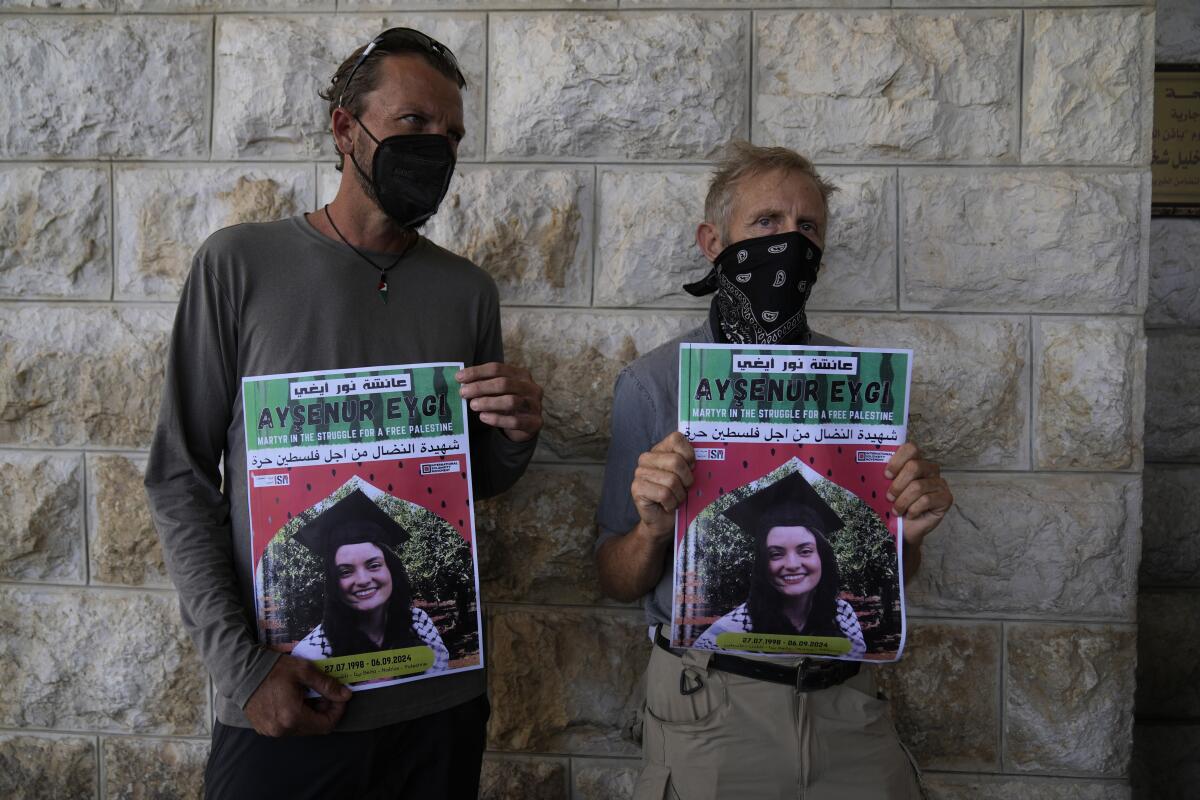
“I saw a soldier on the rooftop training his gun in our direction,” said Jonathan Pollak, an Israeli activist who was a short distance away from where Eygi and a small group of protesters were standing when the shots were fired.
After an earlier, brief clash in which Israeli soldiers fired tear gas at Palestinian protesters, it was calm, he said, and the contingent that included Eygi and her foreign companions had moved some distance away.
“Nothing was happening,” he said in an interview. “It was quiet.”
Then Pollak heard two shots, and panicky shouts erupted behind him.
“I saw Aysenur lying on the ground beneath an olive tree, bleeding to death,” he said. He and others tried to render first aid, but even though paramedics arrived quickly, it was obvious they could not save her.
In Israel, thousands honored Hersh Goldberg-Polin, a California native and the only U.S. citizen among six hostages found killed in Gaza.
“I could see brain matter,” said a European protester who was a few yards away at the time, who wanted to be identified only as Mariam. Eygi, a dual U.S.-Turkish national, was later pronounced dead at a hospital in the nearby northern West Bank city of Nablus.
On Monday, hundreds of mourners marched in Nablus. They hoisted Eygi’s body, draped in a Palestinian flag and a black-and-white kaffiyeh, and denounced the young woman’s death as the cold-blooded murder of a peaceful protester.
Her family said she would be buried in Turkey, where Eygi was born before spending her childhood and early adulthood in the United States.
The Israeli military, which acknowledged firing shots to quell what it called a threat to troops’ safety, said in an initial statement Friday that it was investigating the episode, but did not respond to subsequent queries.
After the deaths of Israeli hostages, Prime Minister Netanyahu and the Palestinian militant group Hamas show no signs of budging on a cease-fire deal.
The White House said Friday that it was “deeply disturbed” by news of the death, and Secretary of State Antony J. Blinken said the Biden administration was seeking additional information from Israel.
But in the intervening days, Eygi’s friends, family and associates have voiced doubts that anyone would ever be held accountable for the killing — especially if it is the Israeli military that is doing the investigating.
They pointed to the similar deaths of not only Palestinian civilians, but also other U.S. citizens in the West Bank and Gaza, including the veteran Palestinian American journalist Shireen Abu Akleh. She was shot dead in the northern West Bank in 2022, while reporting on an Israeli raid in the Jenin refugee camp.
The Israeli military eventually apologized for Abu Akleh’s death, citing the “high probability” she was shot by a soldier, but said she was mistakenly targeted. No criminal inquiry was opened.
Israel’s killing of World Central Kitchen aid workers in Gaza is the latest example of an incident provoking outrage but potentially little deep change.
“There’s a culture of cover-ups,” said Neta Golan, an Israeli activist and a co-founder, in 2001, of the International Solidarity Movement, which organizes nonviolent protests in the Palestinian territories, including Friday’s in Beita. “Israeli investigations are not investigations, they’re ‘How do we cover this up?’”
The killing sparked broad calls for an independent inquiry, including from the United Nations.
“People should be held accountable,” said Stephane Dujarric, spokesman for the U.N. secretary-general, Antonio Guterres.
In a weekend statement, the Eygi family also called for an independent investigation. “An Israeli investigation is not adequate,” they said.
Pressed for a fuller response to the killing, State Department spokesman Vedant Patel said Monday that U.S. authorities continued to wait for Israeli officials to present the findings of their own investigation.
“We are ... encouraging our partners in Israel to quickly and robustly conduct and conclude their process and make their findings public,” Patel told reporters at the State Department in Washington. “We are ... not going to get ahead of that process.”
Israeli officials have said little publicly about Eygi’s death, although an Israeli spokesman said the U.S. ambassador, Jack Lew, raised the subject in a weekend meeting with President Isaac Herzog, whose role is mainly ceremonial.
Mohammad Abu Al-Qumsan lost his children, wife, and mother-in-law in an Israeli strike that hit a Gaza Strip apartment building while he was away.
“The president expressed his sorrow over her death, and said the incident was being investigated by the [Israeli military],” said the spokesman, Jason Pearlman.
Israeli authorities have long regarded the International Solidarity Movement as a thorn in their side, sometimes seeking to halt entry of foreign activists who travel to the Palestinian territories via Israel to participate in its protests. In 2003, another American activist with the organization, 23-year-old Rachel Corrie, was crushed by an Israeli army bulldozer as she tried to block home demolitions in the Gaza Strip.
Corrie’s parents, Cindy and Craig Corrie, said Eygi’s death revived painful memories. The couple, who founded a nonprofit foundation in their daughter’s name, also called for an independent investigation into Eygi’s killing, which they likened to Rachel’s.
The latest episode raised diplomatic tensions between the United States and Turkey, a NATO ally that has been harshly critical of U.S. backing for Israel in the 11-month-old war in the Gaza Strip. The Turkish Foreign Ministry condemned Eygi’s death, describing it as murder.
Turkish officials said that repatriation of Eygi’s remains had been complicated by a deadly weekend attack at the land crossing between the West Bank and Jordan, and that the body might have to be transported via a direct flight to Turkey. On Sunday, a Jordanian gunman killed three Israeli civilian workers at the crossing, which was closed in the aftermath.
The Allenby Bridge, where Sunday’s deadly shooting took place, is the only crossing connecting the West Bank with Jordan.
Since the Gaza war began in October, violence has surged in the Israeli-occupied West Bank, with more than 600 Palestinians killed, according to U.N. figures.
In light of that, some critics have questioned whether international activists were deliberately putting themselves in harm’s way by taking part in demonstrations such as the one near Beita, which take place almost every week.
Mariam, the European protester who was a few yards away from Eygi when she was shot and was with her during preparations for the protest, described her as serious-minded and aware of the risks, but joyful.
“She had the most beautiful smile,” said Mariam, who did not want to be fully identified for safety reasons.
Associates from Egyi’s college days described her as committed and passionate.
She “abhorred suffering and believed in justice,” Kyle Haddad-Fonda, a University of Washington history lecturer, told the Seattle Times.
Since 2020, more than a dozen Palestinians have been killed in protests against the Israeli outpost of Evyatar, whose establishment contravened international and Israeli law. Palestinians say the settlers have seized private lands in a campaign of violence and intimidation against villagers.
Protest organizers said that Eygi and those with her that day did what they could to safeguard themselves, but that the dangers were clear to all. Illustrating that, a 13-year-old Palestinian girl was shot and killed the same day in a town a short distance away, as she watched a clash between troops and Palestinians from her window.
“She really played it safe,” International Solidarity Movement co-founder Golan, who was not present at Friday’s protest, said of Eygi.
“She stayed in the back. They went into the olive grove, and there was nothing happening where she was. She should have been safe.”
Times staff writer Tracy Wilkinson in Washington contributed to this report.
More to Read
Sign up for Essential California
The most important California stories and recommendations in your inbox every morning.
You may occasionally receive promotional content from the Los Angeles Times.


